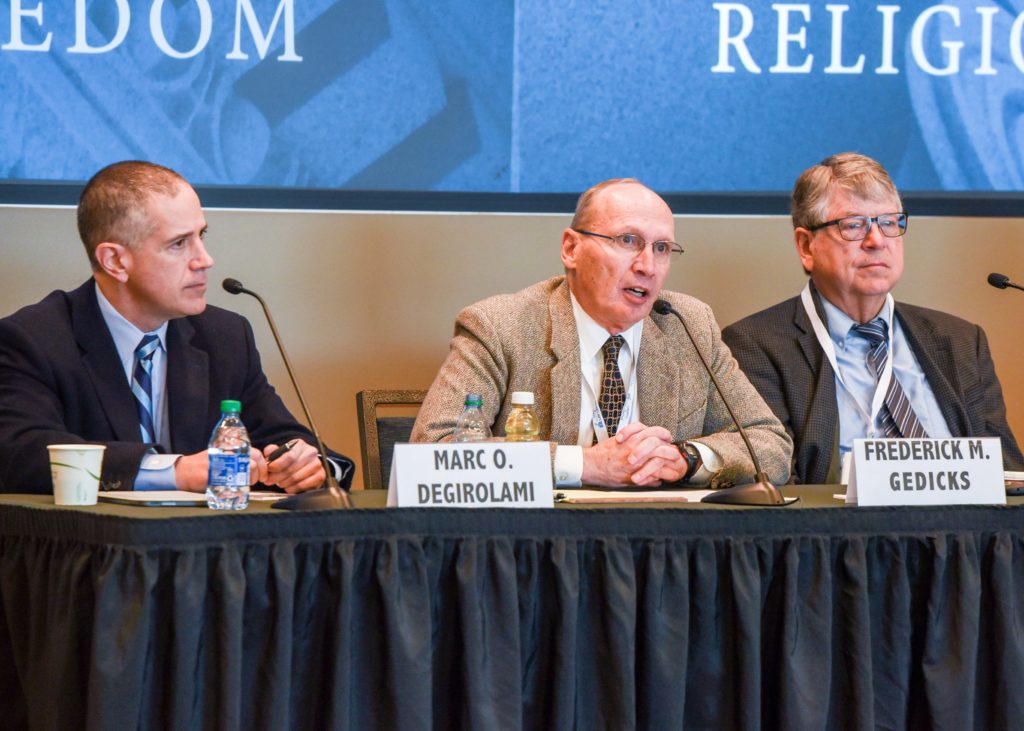At a recent conference on different topics related to religious freedom in the United States, one idea reappeared throughout the discussions: how religious freedom exemptions are used to legally protect people who hold culturally unpopular opinions on social issues such as abortion and transgenderism.
The scholars argued that, while many people have a religious basis for their objections, there also are valid objections based on reason.
George Mason University's Antonin Scalia Law School in Arlington hosted the March 24-25 conference, titled "Beyond 'Defensive Crouch,' Religious Freedom."
One of the March 25 panel discussions featured Helen Alvaré, a law professor at George Mason's law school, and David S. Crawford, dean and associate professor at the Pontifical John Paul II Institute for Studies on Marriage and Family in Washington.
Though the conversation began with a discussion on gender ideology, the topic of religious freedom exemptions arose.
"I've had a concern for a long time with the way we use religious liberty in the context of the gender wars," said Crawford. "Even in (Supreme Court case) Thomas v. Review Board (of the Indiana Employment Security Division), the court says religious belief need not be acceptable, logical, consistent or comprehensible to others in order to merit First Amendment protection.
"So we tend to capitulate to this tendency to say, 'Well the reason we think there are men and women in the world is because the good book (Bible) told us so.'"
In the 1981 case, the Supreme Court ruled 8-1 Indiana's denial of unemployment benefits to the plaintiff violated his right to religious expression.
Eddie Thomas, a Jehovah's Witness, quit his job at a foundry when he was transferred to a department that produced turrets for military tanks. He said he could not conscientiously help produce the turrets without violating his religious principles. He quit and sued for unemployment benefits.
Crawford believes divine revelation isn't the only way to discern the truth about humanity. "Is man, woman, the family a religious, theological reality or, is it a philosophical, metaphysical, anthropological and secular reality? The answer is it's both," he said.
"I think revelation goes in both directions," said Crawford. "If you believe in creation, you have a real commitment to the integrity of the things of this world because God made them and therefore they have an internal order and logic."
"That's especially true of sexual difference," he continued. "I wouldn't want our religious liberty arguments to effectively make it seem like the real basis of men and women is simply revealed (by God) and not a rational, philosophical, metaphysical foundation."
Draining religious faith of its rationality ultimately weakens the arguments many people of faith make about social issues, said Crawford. "What you're doing is saying, 'I'm not asking you to understand or agree with what I'm saying, I'm just asking you to accept it because I hold it sincerely, and by the way, please disregard (the) discriminatory effects of my quaint belief.'"
During another panel titled "Reimagining Religious Freedom in its 21st-century Context," Marc O. DeGirolami, a law professor and co-director of the Center for Law and Religion at St. John's University School of Law in Queens, N.Y., spoke about how those in power have used religion to discredit minority opinions.
He presented a paper in which he posits that a new ruling class with new ideals has replaced the long-standing Christian-sympathizing establishment.
"Partisans of the new establishment often dismiss dissenting views as religious and in this way they embroil the new establishment in religious disagreement," said DeGirolami.
"In an exchange in the oral argument in Dobbs v. Jackson Women's Health Organization (a Mississippi case about abortion restrictions)," he said, "Justice (Sonia) Sotomayor asked counsel for the state, 'How is your interest anything but a religious view? When you say this is the only right that takes away from the state an ability to protect a life, that's a religious view, isn't it?'"
"Now formally, Dobbs is not about religion, it is not a First Amendment case," DeGirolami continued. "But practically it is. Justice Sotomayor was portraying the law as religiously motivated and therefore illegitimate."
He argued that, while the primary form of legal resistance to the creeds of the new establishment has been religious freedom exemptions, those exemptions entrench the establishment.
"Exceptions are validations of the state's position of dominance in the domains of its control," said DeGirolami.
Alvaré agreed that religious carve-outs can keep people of faith in a defensive crouch.
"Sometimes to have exemptions is to bow to the existing regime and what we really want is more reason," she said. "A strategy for going beyond exemptions and actually changing the system, well now we're talking about classical schools, private or home schooling, and we are also talking about political solutions, of folks saying, 'Let's talk reasonably, scientifically, let's look at observations from nature and science.'"
While religious exemptions have given people of faith legal protection for their beliefs, Crawford and the other scholars pushed for a recovery of legal rationality.
"I don't know if the arguments are ever going to work, but you have to keep making these arguments," he said. "There has to be more than this modern positivistic understanding of reality."

